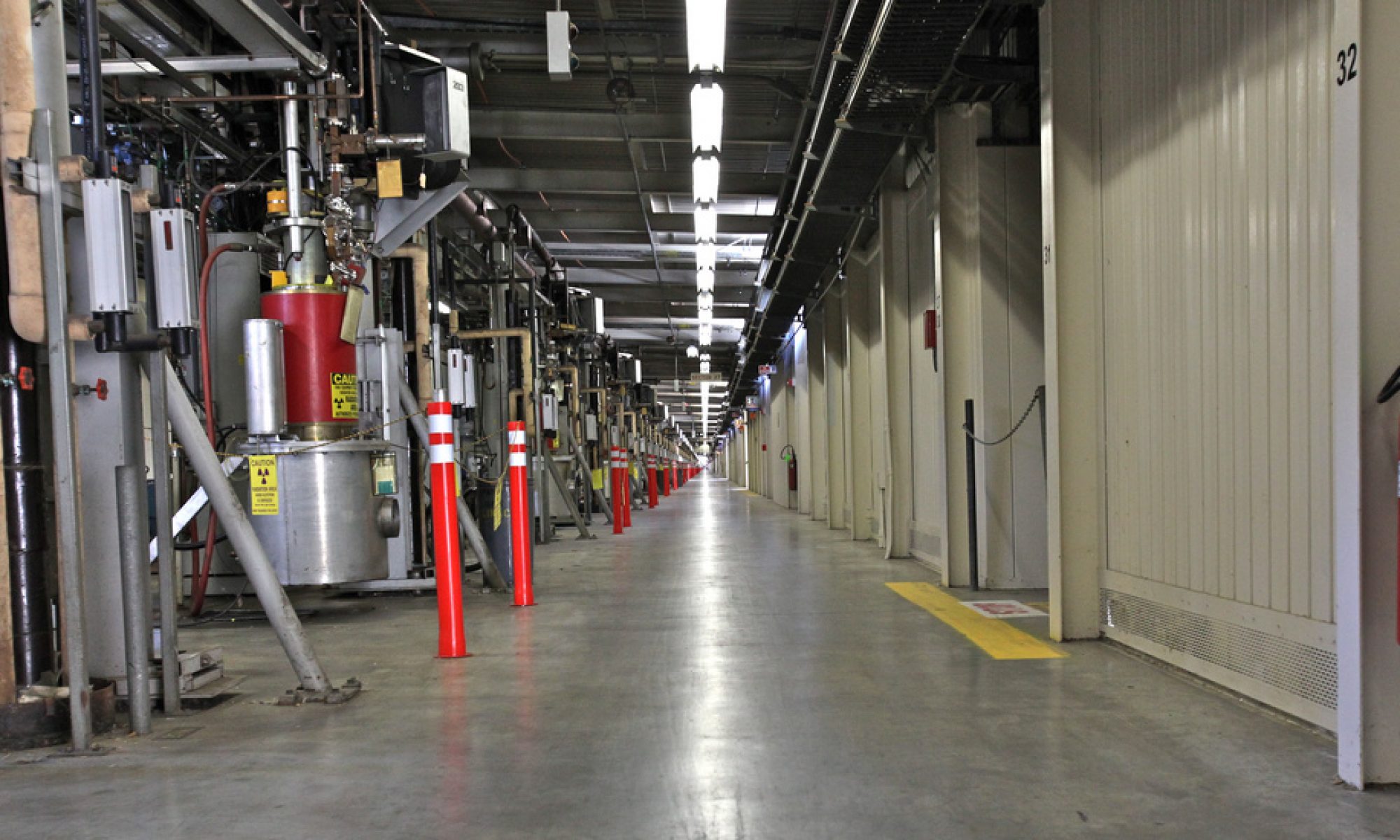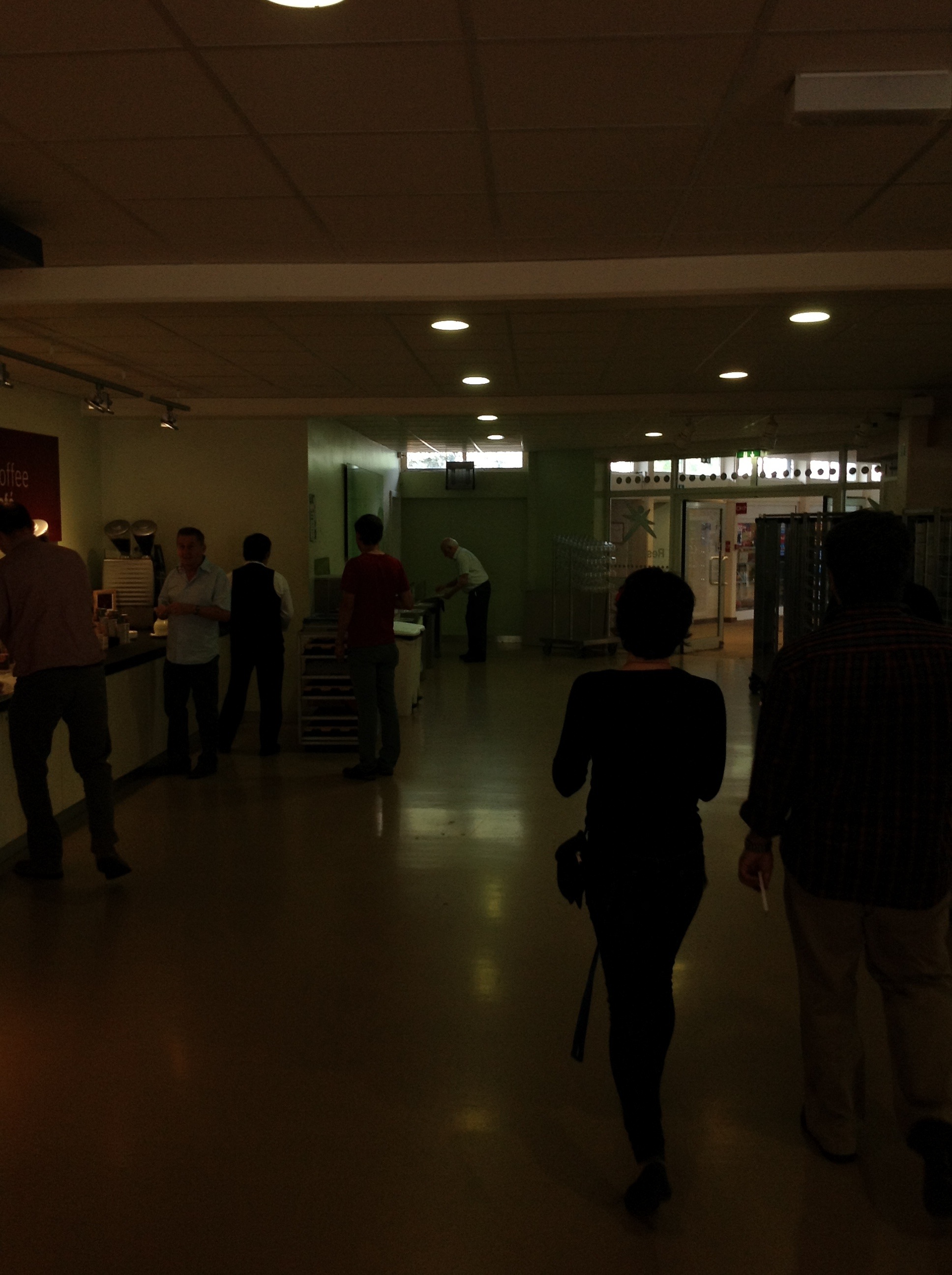Why, yes . . . That is Peter Higgs putting his tray away in CERN restaurant number 1.
Balancing public and private to insure good science
 With the International Conference on High-Energy Physics just around the corner, rumors have been flying about what the ATLAS and CMS Experiments will have to say about the Higgs boson. As a member of the ATLAS Collaboration, I won’t comment on any specific rumors and I won’t start any of my own. In this short post, I want to emphasize one thing: rumor is an enemy of good science.
With the International Conference on High-Energy Physics just around the corner, rumors have been flying about what the ATLAS and CMS Experiments will have to say about the Higgs boson. As a member of the ATLAS Collaboration, I won’t comment on any specific rumors and I won’t start any of my own. In this short post, I want to emphasize one thing: rumor is an enemy of good science.
Consider this: confidence in your process is a critical hallmark of sound research. The results are only “good” if the means by which they were obtained are defensible. A “good” result is NEVER one that you simply agree with, or which confirms an expectation. In fact, many good results have dis-confirmed a long-cherished notion or a beautiful idea. But in the end, the integrity of the process determines whether you should “like” the results . . . whether or not you like the results should NEVER determine the integrity of the process.
Gossip and rumor poison the process. Researchers who practice an honest craft strive to avoid making biased decisions while at the same time deliberately designing tests that check for unconscious bias. Research methodology is also exposed to a grueling gauntlet of peer review, wherein no one is satisfied until the research has been beaten to a pulp. Good research withstands the withering meat grinder of criticism. That criticism comes from the researcher themselves, their collaborators, and their peers in the wider community.
 The poison of rumor serves to do at least two things. It attempts to tip the hand of the researcher, who is purposely keeping their results private until they are certain that the research cannot be easily debunked by the community. It also attempts to trick the researcher into biasing themselves. For instance, a rumor of another scientist’s positive or negative result might plant a seed of doubt in the mind of the researcher, causing them to inadvertently make poor decisions about their research and causing either unconscious or conscious bias.
The poison of rumor serves to do at least two things. It attempts to tip the hand of the researcher, who is purposely keeping their results private until they are certain that the research cannot be easily debunked by the community. It also attempts to trick the researcher into biasing themselves. For instance, a rumor of another scientist’s positive or negative result might plant a seed of doubt in the mind of the researcher, causing them to inadvertently make poor decisions about their research and causing either unconscious or conscious bias.
ATLAS and CMS are working under tremendous time pressure to provide good results in time for ICHEP. The data they intend to use for those results was only delivered in completion by the collider a week ago. I’m giving nothing away by saying that already the latest data is making its way into many different analysis projects that will be unveiled for ICHEP. But the gossip and rumor out there, in some cases being served up by peers in the field, is attempting to make the difficult game of doing good science into a dangerous game that now requires fending off jackals. It’s to the credit of the researchers in ATLAS and CMS that they seem to be trying hard to ignore the gossip.
Public and private together play important roles in science. Ultimately, the publication of results is a critical hallmark of good science. The community must be informed of results so that collective progress in our understanding of the universe can be made by further testing and applying those results. But the privacy of the results (until they are ready) is a critical act in insuring the integrity of the process. Privacy, for at least a time, allows the researcher to think of ways to test their own assumptions and to vet the process and the conclusions from the process. Privacy is critical to avoiding pressure to get one answer or another answer; privacy gives the data a chance to speak for itself. Violations of either of these are always a bad thing, and threaten the pace of scientific progress.
So to all of you rumor-mongerers out there who are also practicing scientists, I ask you to reflect on the importance of privacy and publicity in science. Consider that the next time you land a tasty hunk of grade-A gossip from a trusted source. One day, the poison of gossip and rumor may be turned on your work, and it tastes bad whether you or somebody else has to swallow it. In fact, it may be the one poison that ruins the poisoner and the victim.
The Scientific Method: an OPERA
I posted a version of this earlier on Facebook:
Today, the OPERA experiment and CERN announced that they found a cabling problem to their GPS system that may explain the “faster than light” neutrino result. [1] I say “may” – more tests are required to see if this is true.
Now for the snarky part . . .
OK, students of physics – here we might have a VERY important life lesson. CHECK YOUR CABLES. And next time Profs. Randy Scalise or Tom Coan criticizes your handiwork with the lab equipment in PHY4211, remember this: they’re trying to save the field.
Now for the less snarky part . . .
All joking aside, I imagine this was a very difficult problem to track down. We’ve all made mistakes in the lab. What matters is finding them and admitting them, so that progress in the field is not forced down a blind alley. As a scientist, I am proud that OPERA was able to track this down, test the hypothesis, and identify a measured correction to the neutrino time-of-flight. It would have been FAR worse to stand stubbornly behind a potentially wrong result.
I suspect that this will be widely reported as a “failure” of science. Quite the opposite. Science is NOT a collection of results. It’s especially not a collection of sexy results that you would LIKE to be true. Results are only as good as the process that led to them. If the process is flawed, the results are unreliable. Finding a potential flaw in the process is the natural progression of the scientific method. Science worked outstandingly here, and before too many people on other experiments wasted too much time chasing down this measurement.
That said, OPERA still needs new data with the fix in place. Only then will this cable issue be thoroughly tested. It will still be interesting for at least one more experiment to try this measurement independent of OPERA.
Rather than demonizing OPERA, let’s celebrate the scientific method – the only way of knowlng ever invented by our species that allows for measurable and meaningful progress by our species. Today, it worked again.
[1] http://press.web.cern.ch/press/PressReleases/Releases2011/PR19.11E.html

